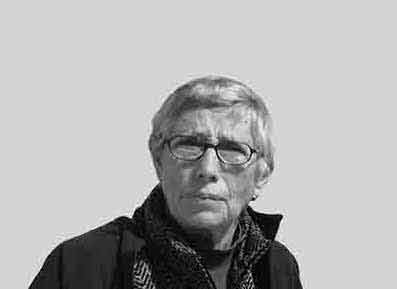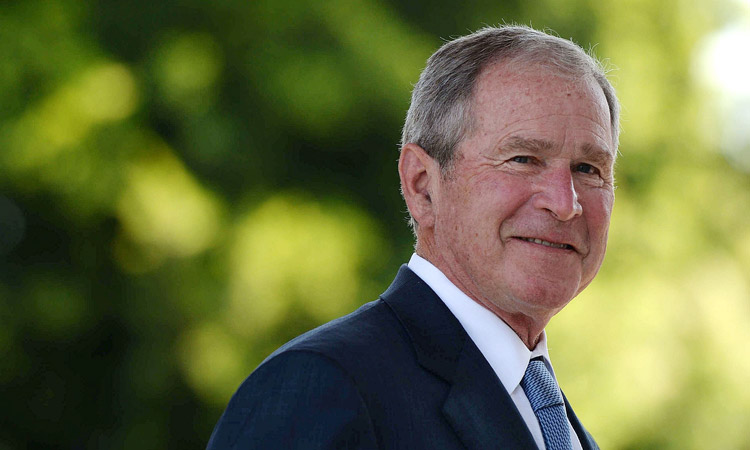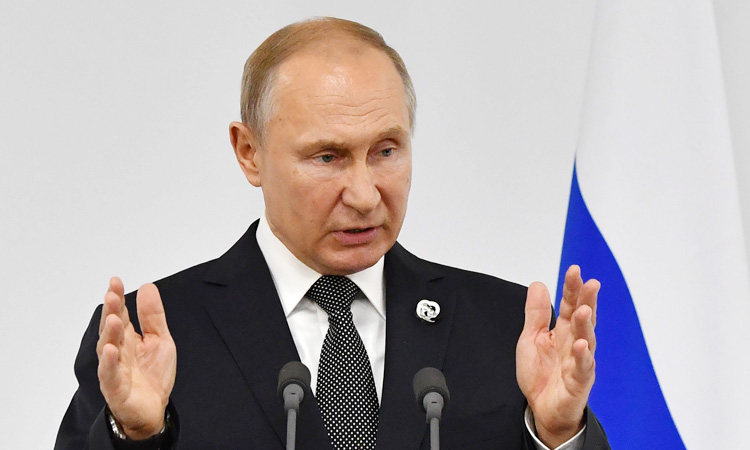Serious questions

Michael Jansen
The author, a well-respected observer of Middle East affairs, has three books on the Arab-Israeli conflict.

George W Bush visiting Fort Drum in New York on July 19, 2002.
Although Russia — along with the US, and Ukraine — is not a party to the ICC, the warrant could put Putin at risk of detention if he were to travel to any of the 123 countries which are signatories of the 1988 Rome Statute which created the ICC and entered into force in 2002. This was just in time for the ICC to tackle the architects of Washington’s totally unprovoked war on Iraq. This will never happen. Western leaders enjoy impunity, live in luxury and travel freely.
The main Iraq culprit, George W Bush left office in 2009 under a dark cloud. Although his approval rating was 33 per cent, he continues to believe he was right to make war on Iraq. He has retired to his Texas ranch and to a house in a wealthy Dallas neighbourhood where he was welcomed by neighbours. He has established the George W. Bush Institute, library and museum at Southern Methodist University in Dallas, delivered $100,000 speeches at political events, undertaken charity work, and painted. He repeatedly condemned Trump era Republicans for fracturing US party politics although this process had begun before the war on Iraq and accelerated under the Obama administration. His net worth is estimated to be £90 million.
Bush’s Vice President Dick Cheney played a leading behind-the-scenes role in mounting the Iraq war by falsely claiming Iraqi President Saddam Hussein retained banned weapons of mass destruction and had ties to al-Qaeda. Cheney also pressured US intelligence agencies to adopt and promote these false pretexts for the Iraq war.
After leaving office, Cheney did not retire but continued to operate in public, shifting from his residence in home state Wyoming to houses near Washington when he had work in the US capital. His fortune, said to be between $89-100 million was largely earned as chairman of the board and chief executive officer of Halliburton, which provides logistics services to the US military as well as oilfield services. Halliburton was the sixth largest US defence contractor when Cheney became vice president.
In 2012, he backed liberal Republican Mitt Romney for president and in 2016 he endorsed Donald Trump. During that race Cheney’s daughter Liz won a Republican seat in the House of Representatives. After the Trump-inspired attack on the Capitol in January 2021 while Congress was set to confirm the election of Joe Biden as president, Liz Cheney became Trump’s most vocal critic in the party and lost her seat in 2020.
The third member of Bush’s Iraq war team was Defence Secetary Donald Rumsfeld who died in June 2021 at 88 years at his ranch in Taos, New Mexico. A staunch Cheney ally, Rumsfeld served from 2001 to 2006 under Bush. The New York Times reported he was regarded as “the most powerful defence secretary since Robert S McNamara [who held the post] during the Vietnam war.” By some, he was also seen as the “worst” defence chief in US history. He deployed only the minimum number of US troops to win the war but too few to impose law and order when chaosm anarchy and sectarian conflict reigned after Saddam Hussein had been ousted.
Despite the turmoil caused by the war, Rumsfeld never apologised for the war or his flawed conduct of the campaign. As Rumsfeld’s rising unpopularity harmed Bush, Rumsfeld was compelled to resign in 2006. In retirement, he published his autobiography, “Known and Unknown: A Memoir,” and “Rumsfeld’s Rules: Leadership Lessons in Business, Politics, War, and Life.” His fortune from his business career when not in office amounted to $200 million.
Rumsfeld’s deputy Paul Wolfowitz has been widely regarded as the actual architect of the Iraq war. He proposed Iraq rather than Afghanistan as the chief target in the wake of al-Qaeda’s attacks on the US. He left the Bush administration in 2005 when he became president of the World Bank but was forced by scandal to resign in 2007. He is a visiting scholar at the neoconservative-leaning American Enterprise Institute.
Wolfowitz, Cheney and Rumsfeld were founding members in 1997 of another neo-conservative think-tank, the highly influential Project for the New American Century (PNAC) which lobbied for a war on iraq. They and another seven of the signatories were members of the Bush administration. PNAC stalwart John Bolton was Donald Trump’s national security advisor from April 2018 until September 2019.
Senator Joe Biden called for the overthrow of Saddam Hussein in a 1998 Senate hearing and he voted for the war in 2002 while he was chairman of the Senate Foreign Relations Committee. The Democrat-controlled Senate vote authorising the use of force in Iraq took place on Oct.11, 2002, with 77 senators in favour, including 29 Democrats, to 23 against. Biden not only collaborated with the mainly neoconservative sponsors of the war but also proposed partitioning Iraq into Sunni, Shia and Kurdish entities. This would have precipitated horrendous ethnic cleansing and displacement.
Neoconservatives (neocons) belong to a political movement which began to emerge in the 1960s among liberal hawks who advocate US global interventionism to promote US hegemony, democracy, and neo-colonialism. They were influential in Republican administrations from the 1970s through Trump but enjoyed greatest influence during George W Bush’s years in the White House (2001-2009). The Biden administration includes sub-neocon interventionists Secretary of State Antony Blinken, National Security adviser Jake Sullivan, and Director of National Intelligence Avril Haines. Under Secretary of State Victoria Nuland is a full neocon. Among neocon legislators are House speaker Kevin McCarthy, Senate minority leader Lindsey Graham, ex-Vice President Mike Pence, Senator Marco Rubio of Florida, and Senator Tim Scott of South Carolina. Neocons are far from being a spent force.
Writing in Tikkun, US economist Jeffrey Sachs argued that the neocons “championed NATO enlargement to Ukraine even before that became official US policy under [Bush] in 2008.” Sachs said the expansion of the alliance “up to the border of its old enemy, Russia, is an important justification by [Putin] for his invasion of Ukraine in February 2022.”
Although Putin and his predecessors repeatedly warned against NATO expansion, he was provoked to mount a full-scale invasion after Ukrainian President Volodymyr Zelensky — alarmed by Russian mobilisation in the eastern Donbas region following violent incidents — called on April 6, 2021, for NATO to fast-track his country’s alliance membership.
Photo: TNS







